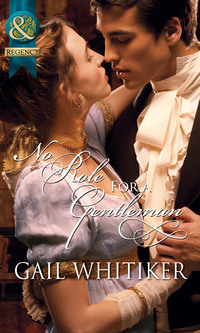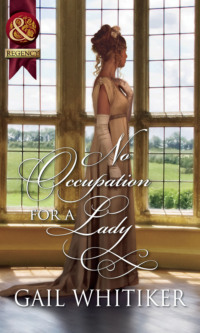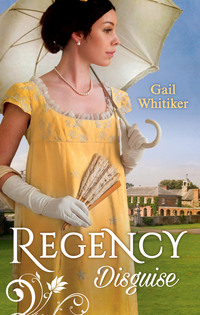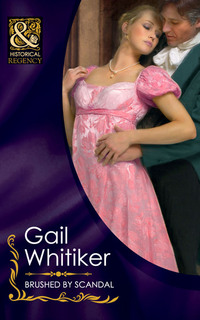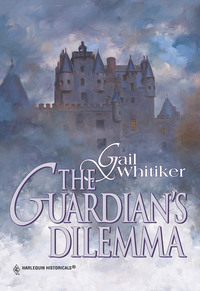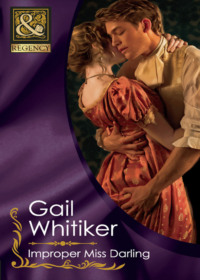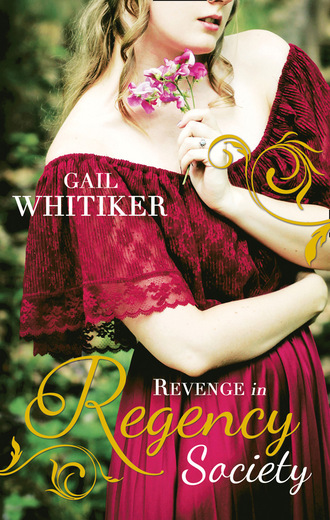
Полная версия
Revenge In Regency Society
‘I haven’t time.’ His voice was unusually brusque. ‘I’m going riding with friends and I’m already late.’
‘Then you’ll just have to be a few minutes later,’ Anna said, putting her hand on his arm and turning him around. ‘Where were you last night? I was worried about you.’
‘You had no reason to be. I simply went out.’
‘But not until after you spoke to Papa. Why did you leave again? And why didn’t you come home?’
He flicked the hard leather crop against the top of his boot. ‘I lost track of time. When I realised how late it was, I decided it was best I just stay out.’
‘Why? Because of something Papa said?’
Peregrine was a good-looking young man with a shock of thick, black hair, deep brown eyes and a wide, generous mouth. A mouth that suddenly narrowed in anger. ‘I don’t care to talk about it.’
‘But you don’t have a choice, Peregrine. There’s a rumour going around town that you are having an affair with Lady Yew,’ Anna said, needing him to understand the gravity of the situation. ‘I know it isn’t true, but you can’t simply pretend the rumour doesn’t exist.’
‘As a matter of fact, I can. I told your father as much when he questioned me about it last night and I certainly don’t intend to stand here and justify my behaviour to you!’
Stung by the vehemence of his reply, Anna said, ‘I’m not asking for justification. I just told you I don’t believe what people are saying. But a meeting is being held this afternoon between Lord Yew and the man he asked to investigate his wife’s infidelity and your name is going to come up—’
‘Damn it, Anna, did I not just say that I don’t want to talk about it?’
‘But you must! Your reputation as a gentleman is at stake, don’t you understand?’
‘What I understand is that a man’s private business is not his own,’ he snapped. ‘Do you know why I jumped at the chance to come to London? Because I was tired of having to listen to my father’s sanctimonious preaching. Of being told what I could and could not do. I thought that by coming here, I would finally be able to lead my own life. Yet now I find that every move I make is watched and criticised by people I don’t know, and that even you and your father have no qualms about intruding into something that is none of your business.’
‘None of our business?’ Anna repeated in astonishment. ‘How can you say that? You are my father’s godson. We care about you.’
He had the grace to look embarrassed. ‘I’m not saying you don’t.’
‘Then why are you being so defensive? I know you didn’t have an affair with Lady Yew,’ Anna said. ‘For one thing, she’s already married. For another, she must be at least fifteen years older than you.’
‘Since when did either of those things matter to the fine, upstanding members of society?’ Peregrine shot back. ‘Half of London seems to be involved with people other than their wives or husbands. Why should Susan and I be any different?’
‘Susan?’ Anna interrupted, shocked. ‘You call her Susan?’
‘Yes.’ He raised his chin in defiance. ‘What else would one call a good friend?’
‘Given that she happens to be someone else’s wife, I would have thought Lady Yew the more appropriate form of address,’ Anna said, concern lending an edge to her voice.
‘You’re being stuffy, Anna. I didn’t do anything wrong,’ Peregrine said. ‘She gave me leave to speak to her in such a manner.’
‘Really? And what else did she give you leave to do?’
The tips of Peregrine’s ears flamed red. ‘Nothing.’ But when he refused to meet her eyes and began fidgeting with his crop, Anna knew he was lying to her—and she felt the foundations of her world tremble.
So, it was all a lie. Peregrine was involved with Lady Yew. Worse, he was in love with her. He’d given himself away when he’d spoken her name. His mouth had quivered and his eyes had softened, the way a person’s always did when they referred to the man or the woman they cared about deeply.
And she, stupidly, had believed him. She had defended him to both her father and to Sir Barrington Parker, a man she had charged with making a false accusation, when all the while it was Peregrine who had been telling lies.
Needing to regain a measure of calm, Anna turned her back on him, clenching her fists at her side. ‘Since you obviously did not see fit to inform my father of the truth last night, I will have it now,’ she said, fighting to keep her voice steady. ‘Are you having an affair with the Marchioness of Yew?’
‘Anna, please!’
‘Don’t Anna me! I want the truth, Peregrine. People’s reputations are at stake here. Mine included.’
‘Nonsense! This doesn’t concern you!’
She whirled to face him. ‘Of course it concerns me! I spoke up on your behalf,’ she cried. ‘I defended you to someone who was ready to think the worst of you. And I refused to believe them when they told me what you were supposedly guilty of.’
Footsteps on the stairs alerted Anna to the fact that they were standing in a place where anyone might hear them, prompting her to grab Peregrine’s arm and pull him into the drawing room. ‘Furthermore,’ she said, closing the door behind them, ‘I assured Father and this … other gentleman that you couldn’t possibly have been guilty of having an affair with Lady Yew because you didn’t even know her.’
‘But I did know her,’ Peregrine admitted.
‘How? I didn’t introduce the two of you.’
‘No. Edward did.’
‘Edward?’ Anna repeated, confused. ‘But … when were the two of you ever at a society function together?’
‘It wasn’t at a society function we met.’ Peregrine ran his fingers through his hair, hopelessly dishevelling it. ‘Edward had been on at me, saying that if I had any hopes of becoming a gentleman, I needed to educate myself in gentlemanly ways.
That meant knowing how to shoot, how to ride and how to fence. Since I’m already a good rider and I can handle a gun, that only left fencing, a sport to which I’ve had absolutely no exposure. Edward offered to take me to Angelo’s and I met the Marquess of Yew there.’
‘That doesn’t explain how you met his wife,’ Anna pointed out.
‘She was waiting for him outside in their carriage,’ Peregrine said. ‘Edward pointed her out to me when we arrived. When I commented on how beautiful she was, he kindly offered to introduce us.’
Kindly? Anna doubted her brother had ever had a kind thought in his head when it came to Peregrine. ‘All right, so you were introduced. If you knew Lady Yew was married, why did you pursue her?’
‘Because on the way home after the match, Edward told me about their marriage. He said it was a loveless union and that Lady Yew was desperately unhappy because Yew paraded his mistresses right under her nose and didn’t give a damn as to what she thought.’
‘Be that as it may, she is his wife and you were wrong to interfere.’
‘But she doesn’t love him!’ Peregrine said, his voice rising. ‘She told me that what she feels for me is the most wonderful, the most exciting feeling she’s ever experienced, and that when we finally are able to be together—’
‘Together?’ Anna interrupted incredulously. ‘Are you telling me that Lady Yew said she was going to leave her husband?’
‘Not in so many words, but—’
‘Don’t play games with me, Peregrine. Did she or did she not say that she was going to leave her husband?’
‘Not exactly, but—’
‘So she made you no promises that she would run away with you,’ she said flatly.
‘Well, no, but—’
‘There are no buts, Peregrine. Lady Yew has been playing with you.’
‘She wouldn’t do that!’ he said hotly. ‘You don’t understand how it is between us! She loves me!’
‘Love? I doubt the woman knows the meaning of the word,’ Anna said dismissively. ‘In fact, I can give you the names of at least ten other young men with whom she claims to be in love. Men with whom she has flirted and danced and driven nearly insane with jealousy. It’s what she does.’
‘I don’t believe you,’ Peregrine said, stubbornly clinging to his beliefs. ‘She said nothing to me about other men. And even if there were, it doesn’t signify. What she felt for them could be nothing compared to what she feels for me. She said she’s never met anyone like me before.’
Anna sat down, aware that Peregrine was no more educated in the ways of love than poor Mercy Banks. ‘I’m sorry, Peregrine, but Lady Yew is not going to run away with you. Her husband is one of the richest men in England. He owns properties in four counties and his personal worth is staggering. As his wife, Lady Yew is one of the most influential women in society. If you think she would risk throwing that all away to run off with the penniless godson of the Earl of Cambermere, I would advise you to think again.’
‘But Edward said—’
‘I don’t care what Edward said,’ Anna said, though she damn well did care and she intended to talk to her brother at the first opportunity. ‘Tradition is the foundation upon which society is built. Noble families marry into noble families, thereby ensuring that the tradition carries on. Casting discretion to the wind and haring off because you believe yourself in love with someone else’s husband or wife is destructive to the fabric of society—and nobody knows that better than those who occupy its uppermost rungs. I’m sorry, Peregrine, but the kindest thing you can do for yourself is to get over this as quickly as possible and then move on with your life.’
Anna knew it was a sobering speech, but she also knew it was one Peregrine needed to hear. He had to understand that his hopes were futile, that whatever dreams he harboured were as insubstantial as fairy dust.
‘But I love her,’ he whispered, misery inflecting every word. ‘How am I supposed to get over that? I’ve never felt this way about a woman before.’
‘You get over it by waking up each day and telling yourself that she is married to a man who will never divorce her … even if she wished him to.’
Anna said the words as gently as she could, but she still saw Peregrine wince and felt her heart go out to him. It was never easy hearing that the person you loved didn’t love you in return. In fact, finding out that you were little more than a source of amusement, whether it be for an hour or a day, or even a year, was the most devastating thing imaginable. It destroyed your confidence and tore at the very foundation of who you were.
Having been through it, Anna knew exactly how injurious it was to one’s sense of well-being.
For a few minutes, Peregrine just sat there, his brow furrowed, his eyes bleak with despair as he struggled to come to terms with everything she had told him. It was hard waking up from a dream, but he had been indulging in an impossible fantasy; for his own good, Anna knew he had to come back to reality.
He finally stood up and slowly began to walk around the room. ‘Part of my reason for staying out last night,’ he said slowly, ‘was because I was embarrassed. I never expected your father to find out what was going on. I thought it was just between Sus—between Lady Yew and myself.’
‘Yes, I’m sure you did,’ Anna said. ‘But while London might seem like a big city, never forget that there are eyes and ears everywhere. When you play with fire, you will eventually get burned.’
‘I know, but you never really believe that. It’s as though you’re living in a bubble. You can see out, but no one can see in. But, of course, everyone can.’ Peregrine dropped his head and breathed a long, deep sigh. ‘Your father thought it would be a good idea if I were to … write a letter to Lord Yew, apologising for my behaviour. He said that if I promised not to see Lady Yew again, it might … smooth things over with him.’ He raised his head. ‘Do you think he’s right?’
Aware that it was Sir Barrington Parker who had suggested writing the letter, Anna simply inclined her head. ‘I think the letter a good idea, yes. With luck, it will set the marquess’s mind to rest and persuade him to let the matter go. Because if he takes it into his head to persecute you, Peregrine, there will be no future for you in London.’
Peregrine nodded, and for a full five minutes he was silent, reviewing his options. Then, as if realising he had none, he said finally, ‘Very well. I shall write the letter. But I’ll give it to you, rather than to your father. I don’t think he ever wants to see me again.’
‘Don’t be a goose, of course he wants to see you.’
‘You weren’t there,’ Peregrine said ruefully. ‘You didn’t see the look on his face. Why do you think I lied to him, Anna? God knows I didn’t want to. But when I saw how disappointed he was at even having to ask me if I was involved with Lady Yew, I knew I couldn’t tell him the truth. So I lied. That’s why I couldn’t stay here last night,’ Peregrine admitted. ‘I was too ashamed to sleep under the same roof as him. He’s been so good to me. I couldn’t bear to repay him like this.’
‘Oh, Peregrine,’ Anna whispered. ‘If Father was disappointed, it was only because he cares about you and wants you to do well in London. He knows how harsh society can be towards those who flaunt its rules.’
‘Then society is a hypocrite!’ Peregrine cried. ‘I’m not the only man involved with a married woman. There are countless other such affairs going on and everyone knows it!’
‘Yes, and they are tolerated as long as they are conducted discreetly and with neither party voicing an objection,’ Anna told him. ‘But for whatever reason, Lord Yew has chosen to object to the liaison and, as a gentleman, you have no choice but to withdraw.’
The gravity of her words must have penetrated his romantic haze, because for the first time Peregrine seemed to appreciate the magnitude of what he had done. He glanced down at his boots, his mouth working. ‘Very well. I shall go for my ride as planned and while I am out I shall think about what I wish to say. Then, I shall come back and write a letter of apology to Lord Yew.’
Anna did a quick mental calculation. Sir Barrington had said he was meeting with the marquess at two. There wasn’t a hope Peregrine would be back from his ride in time to have the letter finished and delivered by then, which meant she had no choice but to send word to Sir Barrington herself.
‘Peregrine. Have I your word that you will stop seeing Lady Yew, that you will say as much in your letter to Lord Yew?’
Peregrine frowned. ‘Have I not just said I would?’
‘Yes, but I need to be very clear as to your intentions.’
‘From where I stand, I don’t think I have any choice.’
‘Fine. Then off you go on your ride,’ Anna said. ‘I’ll see you at dinner.’
‘Not tonight.’ Peregrine got up and slowly walked towards the door. ‘Edward said he would be dining at home this evening and I have no intention of sitting at the same table and letting him humiliate me any further in front of your father.’
‘Why would he do that?’
‘Because I was foolish enough to confide my feelings for Lady Yew to him.’ Peregrine looked at her and sighed. ‘He knew exactly how I felt—and he said nothing at all about it being a hopeless quest.’
Anna needed no further explanation. How could she explain that it was just her brother being himself? ‘I’m sorry, Peregrine. Really, I am. And I know how hard it is not to be with the person you love, but there will be others. You have only to open your heart and let love find you.’
His mouth twisted. ‘I’ve been open to love a long time, Anna, but this is the first time it’s come anywhere close to finding me. Infatuation is one thing, but true love doesn’t come along every day.’
No, it did not, Anna reflected as she sat down to write the letter to Sir Barrington. True love was elusive: as fragile as a sigh, as mysterious as the night. It inspired placid gentlemen to write romantic poetry and sensible young women to lose themselves in dreams. For those lucky enough to find it, love could be a life-altering experience.
But falling in love could also be a painful and humiliating experience, one that shattered a person’s belief in their own self-worth and that was best forgotten as quickly as possible. Her brief, ill-fated liaison with the Honourable Anthony Colder was a prime example of that, as was poor Peregrine’s misplaced affection for Lady Yew. If anyone needed proof of the destructive power of love, they need look no further than that.
Lady Annabelle’s note arrived well in advance of Lord Yew’s visit and while Barrington was relieved that a solution had been found, her words did not make him feel better. Not when he knew what it had cost her to write them.
Sir Barrington,
As time is of the essence and Mr Rand is otherwise occupied, I thought it best to send word of his intentions as quickly as possible. I have been informed that he is indeed guilty of having an affair with the lady in question; however, he has assured me that he intends to end the relationship and that he is willing to confirm the same in a letter addressed to her husband. I hope you will convey these sentiments to the gentleman and that he will find it a satisfactory resolution to the problem.
Neither my father nor Mr Rand has been made aware of this correspondence and I would prefer that it remain that way. As one who has been accused of ‘involving herself in the convoluted lives of others’, I think it the wisest course of action.
It was simply signed ‘Annabelle Durst’ in a clear and legible hand.
So, Mr Peregrine Rand had been unable to maintain his lies in the face of the lady’s questioning. Good—because there was no doubt in Barrington’s mind that Annabelle had questioned him. Profess to believe him she might, but she had still needed to hear from his own lips that he was innocent of the charge and that the rumours were not true.
How devastated she must have been to find out that they were … and how difficult for her to write this note. She had believed wholeheartedly in the young man’s innocence, put trust in her intuition when it came to what he would and would not do—only to discover that her intuition was not strong enough to stand up against the wishes and desires of his own heart. Disillusionment was always a bitter pill to swallow.
He glanced again at the parchment in his hand. Closing his eyes, he raised it to his nose and gently inhaled. Yes, it was still there … a lingering trace of her fragrance, the scent sweet but sensually provocative. An echo of the lady herself. He set the parchment down and walked slowly towards the long window, his mind filled with thoughts of Anna.
It was a long time since a woman had affected him to this degree. Indeed, he wasn’t sure one ever had. For the most part, he’d always believed aristocratic ladies to be like exotic birds: lovely to look at, but troublesome to own. They strutted around society’s stage like the fragile, inconsequential creatures they were, generally offering nothing of substance beyond the ability to play the piano or paint pretty pictures. It was the reason he had found commitment so easy to avoid.
But Lady Annabelle was neither fragile nor inconsequential. She was intelligent. Passionate. The quintessential lady and beautiful beyond all. But beauty without soul had never appealed to him, and it was because she cared so much about other people that Barrington found himself so strongly attracted to her. She cared about Mercy Banks and the host of other silly young women who needed her help in extricating themselves from situations that could have ruined them. She cared about her country visitor, who might well be her half-brother, and about her father, who, with typical male arrogance, was ready to dismiss everything she said. Yes, admirable indeed was the Lady Annabelle Durst. A lady worth getting to know.
And yet, as a result of what had passed between them, Barrington doubted a deeper acquaintance was possible. In his hand, he held her acknowledgement that she had been wrong, and he right. That was the first strike against him. He had proven everything she had most desperately wanted not to believe. She had stood up for a man who hadn’t deserved her loyalty, and she had been let down. Matters would never be easy between them now.
Still, now that he knew the truth about Rand, he would do everything he could to mitigate Lord Yew’s anger and to settle the matter as humanely as possible. As for Rand, if he truly believed himself in love with Lady Yew, he was already suffering enough by having found out what she was really like. No point making it worse by dragging his name through the mud, and by association, the beautiful Lady Anna’s.
The note Anna received from Sir Barrington later that afternoon was brief, but reassuring.
Your note was well timed. I met with Lord Yew, and after being assured of Mr Rand’s willingness to see the error of his ways, the marquess is willing to let the matter go. He will settle for a letter and a promise of restraint on Mr Rand’s part and shall consider the matter closed. I have not written to your father. I leave it to you to inform him of the outcome, and Mr Rand. I remain,
Your most humble servant
B.
Anna folded the letter and tapped it against her chin. So, the matter was resolved. The Marquess of Yew had been informed as to the identity of the guilty party and had been willing to accept an olive branch in the form of a promise and a written apology. Sir Barrington had handled the matter admirably. As long as the marquess honoured his word, Peregrine would be free to go about London without the finger of blame being pointed at him at every turn.
Just as well, since Anna was quite sure he would have bolted had such been the case.
Unfortunately, as she set out for her afternoon visit to the Baroness von Brohm, Anna realised that the entire affair had left a bad taste in her mouth. Not only were her feelings towards Peregrine affected by what she had learned, but her brief acquaintance with Sir Barrington Parker had been tainted by the events they had both unwittingly been drawn into. She had insinuated that he hadn’t known his business, accused him of misjudgement and gloated when she’d believed him wrong. She owed him an apology.
But was he the type of man to whom apologising was easy? She remembered the way he had teased her over her steadfast belief in Peregrine’s innocence, mocking her belief in the man’s inability to tell lies. Would he be condescending of her apology now? Had he been waiting for just such a moment to say, ‘I told you so’? Anna hated to think of him as being deliberately cruel, but, not knowing the nature of the man, she had little else to go on.
She was not at all surprised that thoughts of him occupied her fully during the carriage ride to Mayfair.
Julia von Brohm was not what Anna had been expecting. Thinking to see a pale, unhappy woman in her mid-forties wearing the unrelieved black of a widow still in mourning for her husband, Anna was surprised to be greeted by a slender and very attractive woman of no more than thirty, garbed in a stunning gown of rich burgundy satin. Her honey-brown hair was arranged in a simple but elegant chignon at the nape of her neck, and her eyes were a clear, bright blue that appeared even brighter against the translucent whiteness of her skin.
‘Lady Annabelle,’ the baroness said, extending both hands in greeting. ‘I cannot tell you how pleased I was to receive your note.’
‘And likewise, how pleased I was to receive your acceptance,’ Anna said. ‘I regret that my good friend, Lady Lydia Winston, was unable to come, but her mother was taken to bed with a terrible head pain and required her assistance.’
The baroness’s pretty face softened in sympathy. ‘Poor lady. Having had a mother-in-law who suffered with megrims, I know the role a daughter must play. But I am so pleased that you were brave enough to come on your own.’
Anna tilted her head to one side. ‘Brave?’
‘Come now, Lady Annabella. You must surely have heard the rumours—that I am a lonely widow who cannot stop crying for her late husband. That I am a beautiful woman whose company must be endured, but not enjoyed.’


